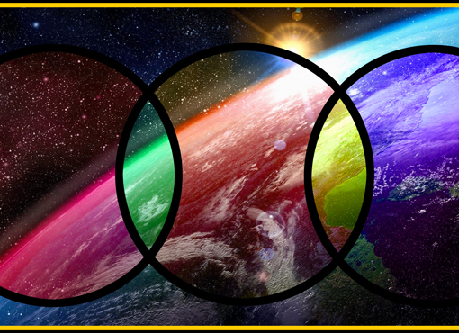Chapter 35: Lampie and Hoagy
The little red Bible that Marie Pleurd had given me had been forgotten during my progress, and it was really the next challenge. It would be my traveling weight, though as I started to walk south it was more like a hot potato, scalding my hands as I juggled it back and forth.
Approaching rather than receding from the sound of motors, I detected a southern road that pokes into Algonquin Park and decided to creep along once night fell, starting from Lake Opeongo, the biggest patch of water inside the park (and something I wouldn’t touch, seeing it as a prime candidate for underwater cats). Trailers packed with watercraft would roll in and out along the road, and I sauntered down the road out of the park with my painful hot potato, sliding off and on the road with any traffic.
After this road I came a highway running east and west, and I decided on west for Toronto, with the nearest big place being Huntsville, 95 km away. Long before then I passed by an arts centre on the left, and my improved eyes perceived a giant floating shape standing over the low little hut, slowly turning to watch me go by. Apparently there was still some oomph in the Native American art that was being commercialized and simplified for the paleface. I waved and didn’t slow down, and the turning being watched me pass along without giving chase. I think it had a peace sign hanging down its neck, so maybe that tutelary wasn’t as traditionally-powered as the likes of Raven or Nanabozho.
In just a few hours my fingertips were all glowing with St. Elmo’s fire, but I fixed that with an opossum trundling across the road just after midnight. Examining the new species contributing its blood to the tank, I noticed that this big one had a large number of teeth going deep into its jaw. Was that normal? The opposable thumbs and prehensile tale made me wonder wildly about living not just for centuries but for far longer, long enough to see a breed of opossum rise to sharpen stones and capture fire.
As for anything new I picked up from this meal, beyond enough raw blood to make my fingertips stop smarting once I put the Bible away, I guessed I might become better at playing dead.
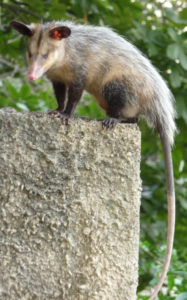
A little light research in the public library at Huntsville during the next night gave me a better answer: possums are extremely resistant to snake venom. If Deer Woman morphed into something venomous and bit me again, I might not pass out so easily. Thanks, Mister Possum. They could also shrug off rabies. I also learned that their brains are one fifth the size of raccoon brains, so they were less likely candidates for next technological species after humanity had run its course, despite those thumbs.
When I got up to leave the library, a small voice coughed. I spun around to see a little old lady who made no sound, who could not be a living human.
“Put that book back on the right shelf.”
“Sure. Why didn’t-“
“You came here for legit reasons.” The old lady tapped her forehead. “I think our watcher in charge at Muskoka Healthcare would like to talk to you. He’s got a man who’s been waiting for a long time.”
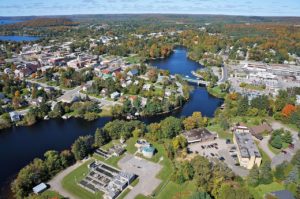
I walked up the main road to the Huntsville District Memorial Hospital, and approached the front entrance, gliding around smokers who seemed to be caught in slow motion, who couldn’t hope to notice me with their dull old eyes in the night. I had to reorientate myself to the human pace of things.
Running footsteps hit the pavement behind me. I looked back down the road from the hospital entrance to the street to see an odd mirage in the moonlight, a little man who couldn’t be an inch over five feet tall hopping over the pavement and then the grass to chase after me.
“Wait! Wait!” None of the humans heard the voice coming across the distance, and I saw the little speedy man simply pass through a parked car in the lot to get over to me faster. I had stopped and taken a seat on the curb, not wanting to leer over him rudely.
“Are you the watchman here?” Up close I saw a man who reminded me of a squashed Mickey Rooney, with buck teeth in a wide and comical mouth, wreathed in a white beard, and I fit him into the lighthouse-keeper role in Pete’s Dragon. He was a watcher against a sea of dark forests filled with monsters like me, so it sort of fit.
“Yes, sorry, I was down getting some Tim Hortons.”
I looked at him sideways. “You know I drink blood, right? I should try to explain-“
“Margaret told me, we’re all the same channel in this town. You want to take people who want to go in hospitals, yes?” ‘Lampie’ took a seat before he could introduce himself, and I noticed that he had brought me a coffee as well.
“Um, thanks.” I gave him my name we shook hands.
“My name’s not Mickey, it’s Paul Peck. They all call me Polly, like the bird. I was just going out on the horn to see if you were the one Paradis talked about.”
My mind reeled. “You hospital guardians are all on a shared network?”
“Yeah.” Polly shrugged. “Humans finally caught up to us a few years ago with those phones. Library and thrift stores, their watchmen and women keep in touch generally too. Margaret said she snagged a Bible in your pack and looked up that little scrawl in the cover in the records before putting it back, then gave Mrs. Pleurd a call to see what kind of guy you were. She had quite a tale to tell – out in K-bec all the tutelaries are jawing about you. They say you went missing.”
“The thunderbirds and the water cats lost track of me while squabbling.” I started opening my coffee, if only to be polite.
“Oh no, wait! See, there’s a way to do your business this time without actually drying the poor patient out like a mummy! You can take his life and make it about as big as a bit of cream, and after that you can drink the coffee!” Polly grinned hugely, and I realized he was proud of himself. “You’ll get your drink and I won’t have to muddle with minds to cover it all up because it will all look like a natural launching!”
I recalled that Paradis had called those near death as the ‘ready-to-launch’. These hospital guardians seemed to think of themselves as NASA people. But this was going too well. “I still need the man’s permission, of course.”
Polly looked bewildered for a moment. “Oh, yeah. Well, let’s go see.”
At first walking slowly to match the small man’s feet, I eventually had to hurry because he was a scampering, nervous fool. I wonder if he had a boss to report to and yell at him about this later.
I passed the threshold of the hospital’s automatic doors without incident, and went up in an escalator to start walking an upper floor, away from the din of an unhappy kid in pediatrics. A nurse came down the hall pushing a rack of empty dinner trays, and Polly deftly pulled me to the side – she didn’t look at either of us.
“I thought you guys were disguised.”
“Total cloaking like this is … well, it’s expensive. Disguises are for more ordinary days.”
“Then I’ll be quick, but I still must ask. What’s his name?”
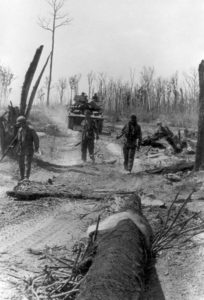
Simon Raymond Lipton was an American moved north, here since the nineties. He had come home from service as a combat engineer in Vietnam in 1971 with an injured foot. As a civilian he taught high school science with a talent for chemistry in Virginia for almost thirty years until a mild heart attack, when he decided that a new land would be better for future health scares on the advice of his daughter, who was married to a man in Mississauga. By this time he was a widower, with his wife Charlotte having a stroke in 1994 and lingering for just two more years. In Huntsville he had been a high school teacher for four more years until formal retirement, and after that he had taken to some of his original overseas work after a fashion, building small bridges that would take park visitors instead of tanks. On one of these projects he suffered a back injury, and from this injury he had been prescribed fentanyl … and that had put him in today’s predicament. The overdose hadn’t been the end of him, but he needed my help to launch.
Slipping into the hallway where patients were closer to death than life, Polly and I tiptoed into Mr. Lipton’s room and gently closed the door. On the narrow bed I saw a rather short man almost as small as Polly, though a certain kind of waning makes all older men look the same. His lower lip was pulled down in a grimace to show that he kept more than half of his teeth, and long nostrils hairs stirred. If Polly looked like Lampie in Pete’s Dragon, Lipton resembled the sidekick of that travelling huckster, his beard and mustache so faint as to be practically transparent. He still had the power to breathe on his own, but that was about it. The room had a light and a radio that were turned on and off by nurses, though from time to time someone might forget at the end of a grueling shift.
“I’ll … try to bring him up to speed,” I said, getting ready for some telepathy. “Helen, get ready to explain things, you might be better than me at that.”
The conversation wasn’t really a conversation – at this level of unconsciousness I was talking into a wall of static, and any kind of answer would emerge like a hidden image of a dolphin. Helen was doing more of the real work as a less-conscious being, and she finally plumbed an answer from the depths.
“He’s … very ready.”
We got to work. Polly’s instructions were to hold out my two hands while on my knees, in a pose of supplication, while Polly himself touched Lipton’s wrinkled but completely slack face in a few places, finally setting on the forehead. Then, with his other hand, he held it over my open coffee cup, which I had bitten into once and held in my cupped hands. I didn’t see anything go in, but I felt the man die as an audible deflating of something like air.
Feebly attempting a bit of logic, I wondered if I created a sort of vacuum with my thirst as a vampire that Polly could then use to draw from Lipton’s ‘tank’, conducting the transfer into the coffee without actually making the deadly vacuum himself.
Then I had to drink the hot coffee fast. “Ideally in one long chug,” Polly said. Helen was moral support when I nearly fumbled two thirds in.
Tiptoeing away now, turning our backs to the empty room. My stomach didn’t feel so good, but I could tell that I needed to leave, so I didn’t ask to visit the washroom.
Our goodbyes were rushed to a quick handshake, because what needed to blast out of my dick was coffee in all of its original heat, scalding me a second time. My body had done literally nothing with it, taking out only the little extra ingredient.
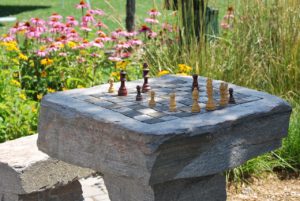
“Mr. Lipton?” I sat in Huntsville’s downtown park, near one of the bridges the old combat engineer had constructed. It was about five in the morning, and only the pond’s ducks were keeping me company.
“What?” It sounded like I was disturbing him.
“Are you able to see and feel what I’m doing like Mrs. Forgrave?”
There was some interior humming, some banging and tinkering, some adjustments, some knocking over and sliding around. The man sounded like a busy mechanic, and my trickle of other knowledge told me that he could do basic mechanic work. He could do carpentry, and hunt a little. And of course he knew his guns, and with the drugs and senescence of his body left behind in the hospital he could go back – he knew his explosives, and his fortifications and his tunnels, and how to not die like a greenhorn in the jungles of Vietnam. His injured foot had been a greenhorn’s fault with stacking rocks during a dig, an old embarrassment that came rushing back to smack both of us just before sunrise.
“Sure I can,” Lipton said. “Just let me … settle in. Damn, it smells like tea and jam around that one … I need a shop. And a drinking cabinet.”
“Um … you have my permission to lucid dream a workshop. Please keep your drinking to off-hours. And in the long term-”
“I know, I know, I’ve been getting intel on that.” He was sounding younger by the minute. “We got a big jungle out there in here, and some red squaw is hiding in the blank region, where no word gets back out from. She’ll come up here in winter when she’s ready, but we’ve got time to dig lines and set up some wire and mines.”
Helen Forgrave perceived the wild parts of my mind as winding claustrophobic catacombs with doors high and low and slanted – Simon Lipton saw too-familiar jungle, just as impenetrable. But the jungle had an edge.
“I’m not Rambo, understand? I don’t go charging into the jungle by myself. I did some basic drills, saw a little action, but nothing great and heroic like the films. Got it?”
“I do. Your work is fortifications at homebase.”
Simon grunted. “Get up higher so I can see the sun over that big bush.”
Chapter 36: A Boy and His Dog
Image credits: Juan Tello, City of Huntsville, Donn A. Starry
